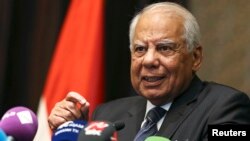CAIRO —
Egypt's interim Prime Minister Hazem el-Beblawi handed in his government's resignation Monday, amid increasing economic pressures, including a series of labor strikes. Beblawi had been expected to reorganize his Cabinet in the lead-up to presidential elections this spring, but the resignation took many observers by surprise.
Hazem el-Beblawi announced the government resignation on Egypt's state TV, saying its existence had been a time fraught with difficulty, but that his ministers had borne the weight with duty and responsibility.
The prime minister stressed it is the “responsibility of all Egyptians to work for reform and the government, no matter how wise or competent, is incapable of creating change on its own.” “The people,” he said, “are the source of the government's authority, and everyone must work for the national interest and not for personal gain.”
Acting President Adly Mansour asked Beblawi to remain in a caretaker capacity and it was not immediately clear if a new government would be appointed before presidential elections, expected in April. The Cairo stock exchange rose on the news.
A Cabinet reorganization had been expected, in order to allow Defense Minister Abdel Fattah el-Sissi to resign and run for president.
Analyst Said Sadek, who teaches political sociology, points out the Cabinet's resignation gives Sissi the option to run or not to run, as he sees fit.
“If Sissi remains in the new Cabinet, this means that he is not going to run. If he uses this opportunity to disappear from the new Cabinet, this means he is going to run as a presidential candidate.... This decision by the Cabinet would also mean it may reduce the heat and the speed of labor strikes taking place,” said Sadek.
A number of labor unions, including the public transport workers union, have gone on strike within the past few days, turning up the heat on the government. It was not immediately clear if any of the unions have ties to the now outlawed Muslim Brotherhood group.
Meanwhile, ousted president Mohamed Morsi, who was in court again Monday on one of four charges, along with other top Muslim Brotherhood leaders, was flown by helicopter out of the police academy after the session was adjourned.
A new set of defense attorneys was appointed by the Cairo bar association after Morsi's previous set of lawyers stepped down.
Hazem el-Beblawi announced the government resignation on Egypt's state TV, saying its existence had been a time fraught with difficulty, but that his ministers had borne the weight with duty and responsibility.
The prime minister stressed it is the “responsibility of all Egyptians to work for reform and the government, no matter how wise or competent, is incapable of creating change on its own.” “The people,” he said, “are the source of the government's authority, and everyone must work for the national interest and not for personal gain.”
Acting President Adly Mansour asked Beblawi to remain in a caretaker capacity and it was not immediately clear if a new government would be appointed before presidential elections, expected in April. The Cairo stock exchange rose on the news.
A Cabinet reorganization had been expected, in order to allow Defense Minister Abdel Fattah el-Sissi to resign and run for president.
Analyst Said Sadek, who teaches political sociology, points out the Cabinet's resignation gives Sissi the option to run or not to run, as he sees fit.
“If Sissi remains in the new Cabinet, this means that he is not going to run. If he uses this opportunity to disappear from the new Cabinet, this means he is going to run as a presidential candidate.... This decision by the Cabinet would also mean it may reduce the heat and the speed of labor strikes taking place,” said Sadek.
A number of labor unions, including the public transport workers union, have gone on strike within the past few days, turning up the heat on the government. It was not immediately clear if any of the unions have ties to the now outlawed Muslim Brotherhood group.
Meanwhile, ousted president Mohamed Morsi, who was in court again Monday on one of four charges, along with other top Muslim Brotherhood leaders, was flown by helicopter out of the police academy after the session was adjourned.
A new set of defense attorneys was appointed by the Cairo bar association after Morsi's previous set of lawyers stepped down.




